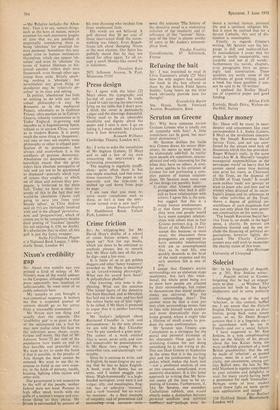Scruton on Greene
Sir: Why have someone review Graham Greene who is totally out of sympathy with him? A little iconoclasm can be good, but near- total destruction! I Mr Scruton dislikes the facile way Greene draws his minor t icters; lie seems to want theM to be elaborately odd-ball. In reality most people are repetitious, uncom- plicated and only interesting for the effect they have on others. A simi- lar point applies to his criticism of Greene for not portraying a com- plex pattern of human relation- ships. Mr Scruton must mean one of two things (or possibly both): 1) either that Greene chooses protagonists who find it diffi- cult to have relationships with others; I agree this is the case, but suggest that this is a major human predicament;
2) or that these protagonists if they were real people would have more complex relation- ships with others than in fact Greene portrays (e.g. in The Heart of the Matter); I don't accept this because, in most cases, the characters these protagonists are supposed to have complex relationships with are so uncomplicated that, as in real life, one quickly descends to the level of the stock response and the only emotion felt is one of pity.
I accept that Greene's exotic surroundings are an elaborate stage machinery, but isn't this inten- tional, the whole point being not to show how people are affected by their surroundings, but rather to demonstrate that moral predica- ments are universal, Why the exotic surrounding then? The answer must be that a man put into alien surroundings conies face to fate with himself much quicker and more dramatically than on home ground, where it might take a lifetime of small events to pro- duce the same confrontation.
Mr Scruton says Greene uses Catholicism as a surrogate for the moral and personal existence of his characters. Once again he is criticising Greene for not doing something he is not trying to do. One can liken Greene to Sophocles in the sense that it is the exciting plot and the predicament for high stakes which makes the book real —not a profound analysis of one or two unusual, complicated, even eccentric characters. It is this latter approach to writing that Mr Scru- ton seems all the time to be ex- pecting of Greene. Furthermore, if, like Mr Scruton, one considers Catholicism rubbish, one would clearly make a distinction between ,personal conflicts and spiritual 'conflicts; and—perhaps even be-
tween a normal. human, personal life and a spiritual, religious life. But it must be realised that for a devout Catholic, this sort of dis-. tinction is meaningless.
Finally, as regards Greene's writing, Mr Scruton says his lan- guage is dull and matter-of-fact. In contradiction I assert that his prose is easily recognisable, very readable and not at all wordy: furthermore his novels, chapters, even paragraphs have an amaz- ingly taut construction. These qualities are surely some of the attributes of good writing, and if a book has these qualities it can, not be said to be 'ill-written'.
I applaud the Bodley Head's use of expensive paper and good binding.
Adrian Firth Eastside, Heath Drive, Walton-on-, the-Hill, Surrey


































 Previous page
Previous page